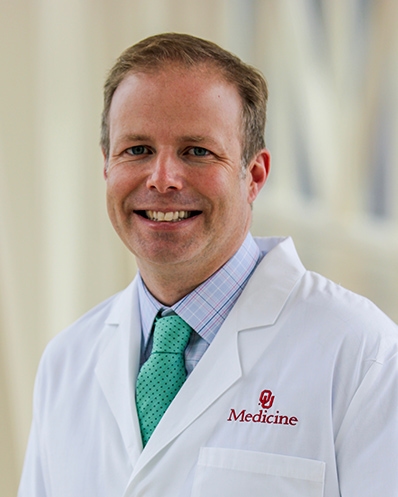Request an appointment with a digestive health specialist at OU Health.
View Locations View Providers
OU Health’s comprehensive clinic for adults with Inflammatory Bowel Disease (IBD) offers access to the latest innovative diagnostic and therapeutic interventions from a multi-disciplinary team. Inflammatory bowel diseases (IBD) affect the digestive tract (stomach, small and large bowel). Some individuals can have other body systems involved – like the eyes, liver, skin, and joints. Without proper treatment, it can cause scarring, bowel damage, and increase the risk of colon cancer. Unlike irritable bowel syndrome (IBS), IBD can lead to severe symptoms that significantly impact your quality of life if not properly treated.
IBD consists of two diseases, Crohn’s disease and ulcerative colitis, both treatable conditions. You and your primary care doctor can consider a referral to the OU Health Physicians IBD team if you experience common symptoms such as:
Request an appointment with a digestive health specialist at OU Health.
View Locations View ProvidersFor early diagnosis and appropriate treatment to avoid long-term complications, your doctor may refer you to OU Health Physicians gastroenterology specialists who use a combination of blood work, endoscopy (including colonoscopy or camera scope tests) and X-ray tests, CT scans or MRI scans to develop an accurate diagnosis.
As part of your OU Health experience, you and your gastrointestinal care team develop an individualized treatment plan that typically begins with medication, including:
If your condition would benefit from surgery, your OU Health Physicians team includes highly skilled colorectal surgeons with extensive experience in performing minimally invasive procedures to remove the affected section of bowel.
When you choose OU Health to care for your IBD condition, you gain access
to the latest innovative treatments and therapies that result from research
studies led by OU Health physician-investigators. If your IBD symptoms
have not responded to other treatments, ask your doctor or talk with a
research nurse on the clinical trials team to find out if you may qualify
to participate in clinical trials at OU Health that can offer treatments
before they become publicly available.
Call
(405) 271-8001 ext. 54331
Or send an email to Maria Mason
–
maria-l-mason@ouhsc.edu.








A recently published study involving pregnant women with gestational diabetes mellitus demonstrates the importance of the mother’s diet in changing ...
OKLAHOMA CITY -- Anyone who suffers from irritable bowel syndrome can testify to its signature trait: It gets worse during times of stress. However, ...
Although screenings and treatments have improved, colon cancer remains the third leading cause of cancer-related deaths in the United States. To ...